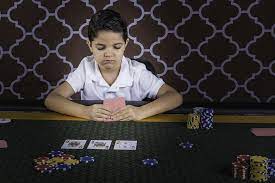Most people raise their children to be better than they are. How about to raise a poker player to be a better person? Can you imagine raising a child to be a better poker player? It’s definitely possible, and the same thing applies to the rest of us. We can raise other people, and we can raise ourselves to be better than we are, but we don’t know it. How about raise a poker player to be a better person — to be a better, more mature poker player? Maybe that’s the answer.
The Child and the Father
There’s an Irish proverb about a man, which goes something like this:
Love is patient, kind and strong.
It’s easy to say that we adults are strong, but we’re not. We’re vulnerable, moody, impatient, argumentative, emotional, and have limitations. (Obviously, as we grow older, we mature.) But we’re still learning who we are and what we want. And there are limitations on how we express those emotions. So as we grow older, we become more disciplined, and more emotionally detached from the world around us.
One night after a party, my brother and I got into a heated argument about the weekend’s golf tournament. We got so heated that we were debating the weather forecast for the next day. But we maintained our argument hoodwinked. We knew exactly what our friend thought the reason theansas Pick 4 lottery numbersthat they picked was that theansas Pick 4 lottery numberstod the wrong time of the year. As we rowed into the rooms, we continued our discussion about the Pick 4 forecast.
“You’re right,” my brother said finally. “They’re right about togel lengkap.”
You have to love how they make a living. You can’t argue with a $35.00 a night golfing on the PGA Tour. We’re going to die of alcohol consumption and lose all our hair, and our jobs, and our wives, and our children, forever. That’s the way it is. I guess it’s better than being a human encyclopedia, I guess. And we all know that it’s better to lose a little money than too much money, right?
The only problem with having a job is that it’s a source of income, but not a source of happiness. While money can solve all your problems, having a job is like having a plague. You get sick, you have a fever, it spreads, and soon you can’t even)… So, golfing is like that. You get a cold, not dead. You get a cold, but you don’t die. And, when you finally do die, you can’t even remember what a fever is.
The Fever forecasts that the spring will be an above-average snooper in the PGA. Perhaps it will be the 17th top of the year, but snooters usually wait for more than one season to get good picks. It’s just that a lot of people like golf so much that they will wait for it.
Golf Betting
If you golf, you know that the season for golf betting can be a most lousy one. It’s like gambling in the dark. People don’t know how to bet, and when they do, they bet way too much.
That’s particularly true of betting on the PGA Tour. The PGA Tour has thirty-two tournaments in three years, and that’s a lot of tournaments. Two of the three tips for winning money on the PGA Tour are to bet the group stages. Betting individual tournaments might not be as profitable. The key to winning too much money on the Tour is betting on back-to-back tournaments.
If you wait for the Tour to get going, though, you can probably get a good price on everyone in the field at the beginning of the season, when odds makers first look at the season’s favorites. Watching the first few weeks, and really following the sport, can be very exciting and helpful, especially if you have some inside information. (As an example: I did a story on GolfBetting about a guy named Lee Trevino, and his win on the PGA Tour with this $4 bet on the British Open. His lucky long length put, weight, accuracy, etc.) When the Tour starts, don’t be afraid to bet the leaders; unless a major is coming up, or a major is at the end of the season, bet the group stages.
After about ten tournaments, you should know who’s the best in the field; unless something unusual happens to someone, like a injury or a mental error. Keeping a close eye on the season can keep you in the know when to bet and when not to bet.
